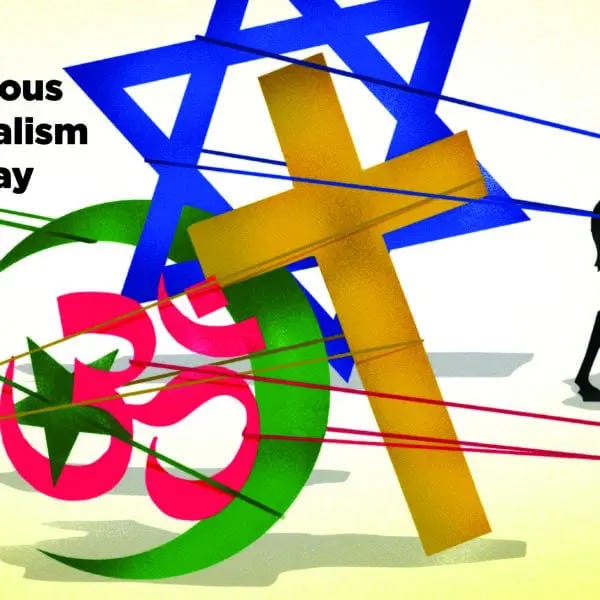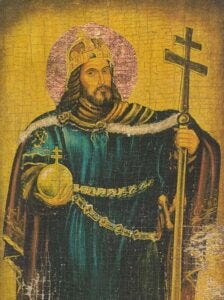From Cross to Crown: The Intersection of Christianity and Statecraft in Hungary
Hungary’s thousand-year history shows the importance of religion in creating and maintaining its culture
By Lilla Nóra Kiss
Christianity has long been a cornerstone of European history and culture, shaping the formation and heritage of many European states. But while the majority of the European Union still identifies as Christian, recent media reports suggest a troubling rise of “Christian nationalism” in some countries, such as Hungary. For example, Hungarian Prime Minister Viktor Orbán is often criticized for allegedly Christian nationalist views, though he has never called for the imposition of a Christian state. But before casually allocating labels to the current status quo, it’s crucial to explore the complex relationship between Christianity and statehood that has defined Hungary’s, and Europe’s, history.
While most European countries have either a Christian foundation or a strong Christian imprint, the degree of current religiosity and adherence to Christian traditions varies widely among them. It’s not a surprise that Christianity has helped to preserve Hungary’s unique cultural characteristics and its place in the European alliance system as well. What is a surprise, though, is that recent articles give the impression that Christianity in these states is a new and radical phenomenon.
Hungary’s Christian Heritage
A thousand years ago, the religious landscape of Europe was undergoing significant changes as paganism gave way to Christianity. The pagan Hungarian tribes faced a difficult choice: to align with either the Catholic Holy Roman Empire in the West or the Orthodox Byzantine Empire in the East. They ultimately chose to integrate with the West, adopting Christianity and Western styles of governance and social structure. This decision by Hungary’s first king, St. Stephen, helped to cement the country’s place in the European alliance system, connected by Christianity and papal confirmation of stable rule.
King Stephen I's adoption of Catholicism cemented Hungary's place in the European alliance. Image Credit: Wikimedia Commons
Religion thus played a role in both interstate alliances and strengthening power and order within states. Moreover, Christianity helped to preserve the unique cultural characteristics of different regions in Europe. Preserving Christianity also meant preserving the state, and after 1,000 years, both the state and Christianity remain central to Europe.
As Hungary underwent Christianization, it adopted contemporary values and legislative solutions. The Catholic Church played a significant role in the formation of the Hungarian political community and in the country’s political and legal affairs, as many politicians, scribes and legal experts were clergymen. From the establishment of the Christian state until the mid-20th century, the pope had the right to legitimize the Hungarian monarchy.
Surviving the Soviet Era
After World War I, Hungary, along with the dissolved Habsburg monarchy, lost the majority of its territory and population. The country faced numerous social, economic and administrative challenges and later fell under Nazi occupation before being “liberated” by the Soviet Union. For nearly five decades, Hungary experienced Soviet-style oppression, economic regression and cultural and social erosion. This repression also involved the destruction of the country’s Christian foundation. During the Soviet era, the communist government sought to undermine and suppress Christianity and other religions, as it saw them as threats to their authority and ideology. The Communist Party’s objective was to establish a secular society by eradicating religion from public life and promoting atheism.
Specifically, the communist regime closed down churches and religious schools (such as Jesuit schools in 1950), banned religious practices and repressed religious leaders. It also forced religious orders and institutions to disband or convert into secular organizations. Religious leaders were arrested, tortured and executed. A heroic example was Cardinal József Mindszenty, a vocal critic of the communist regime and a symbol of resistance, who was arrested, tortured and sentenced to life in prison.

Cardinal József Mindszenty, vocal critic of communism. Image Credit: Jack Metzger/ETH-Bibliothek via Wikimedia Commons
Despite these attempts to suppress Christianity during the Soviet era, it continued to play a crucial role in preserving Hungary’s national identity and culture. Christianity provided a means for Hungarians to maintain their traditions, values and beliefs in the face of oppression. Religious leaders and believers continued to practice their faith in secret, and underground churches and prayer groups emerged. Christian symbols and traditions, such as the Christmas tree, were also kept alive, serving as reminders of Hungary’s cultural heritage.
Moreover, both the Catholic and the Reformed churches played a vital role in Hungary’s opposition movement against the Soviet regime, with some priests and religious figures becoming involved in the resistance. In 1989 the Catholic Church played a significant role in the Round Table Talks, which led to Hungary’s transition to democracy. Christianity has played a crucial role in preserving Hungary’s national identity throughout its history.
Hungary underwent a major political shift after almost half a century of socialist rule, transitioning to a liberal democratic state with a policy of religious neutrality. The country’s first freely elected parliament amended the socialist constitution of 1949. However, it wasn’t until 2010, when the Fidesz party achieved a supermajority, that significant changes were made to cardinal laws—including the adoption of the new constitution (the so-called Fundamental Law) in 2011.
The Fundamental Law recognizes the country’s Judeo-Christian foundation. The preamble (which is not legally binding) refers to Hungary’s Christian heritage and the importance of family, which is a departure from the secular nature of the socialist constitution. Additionally, the Fundamental Law recognizes Hungary’s national symbols and includes a provision protecting the dignity of human beings. The law does not establish an official state church, however, but allows citizens to worship according to their conscience. It includes provisions that protect individual rights and freedoms, such as religious liberty and freedom of speech. These protections of Christian beliefs are nothing new; they reflect Hungary’s long history of preserving its Christian foundations and values, even through challenging times.
The Modern Era: Value-Based Constitutionalism
Value-based constitutionalism and religious neutrality may seem incompatible, but the two ideals can coexist as states make value-based decisions on culture, public services and more, without ignoring the religious content of those values.
Christianity is an important aspect of European history, but modern European democracies have separated state and church affairs through the principle of religious neutrality. This allows for value-based decision-making while also respecting the separation of church and state. The historical perspective and the value-based approach are not alien to national constitutions. Since Hungary was founded in A.D. 1000, making it the seventh-oldest country in the world according to self-sovereignty, history does matter.
Hungary’s constitution starts with the phrase “God bless the Hungarians,” a nod to the country’s Christian roots. This religious foundation, recognized in the constitution’s value-based approach, has played a significant role in Hungary’s history and its place in Christian Europe.
Christian nationalist? Prime Minister Viktor Orbán. Image Credit: Wikimedia Commons
Exaggerated generalizations that label all Hungarians as radicals and paint Christians as enemies only lead to the polarization of society. The narrative of Christians against non-Christians resembles the binary structure of the Marxist class struggles of victimizers and victims, oppressors and oppressed. It is already proven that such narratives only destroy the society. All attempts to abolish the national identity have consistently failed in Hungary, as the country has remained resilient against both 150 years of Turkish subjugation and nearly 50 years of communist oppression. Dividing and changing the society based on faith and religious identity is a tactic that is unlikely to succeed either.
Thus, despite facing numerous challenges and oppressive regimes throughout its history, Hungary’s Christian heritage has played a significant role in shaping its national identity and preserving its cultural characteristics. Modern European democracies, including Hungary, have adopted principles of religious neutrality and value-based constitutionalism, allowing for a balance between the separation of church and state and the recognition of the country’s historical foundations. Defending traditional values and religious freedoms has become a divisive issue in society, but religious traditions have long played a role in preserving nationhood in Hungary. Without understanding Hungary’s history, one cannot form a just opinion about its current challenges or judge the country’s cultural and national identity.




